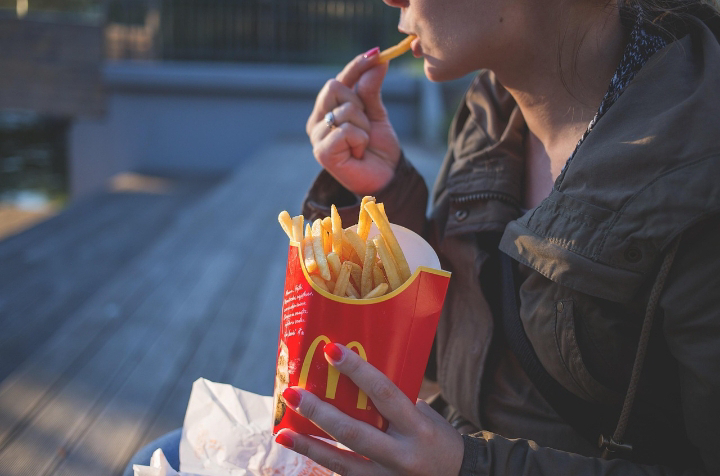Emotional Eating: Why We Do It and How to Stop the Cycle
Emotional Eating: Why We Do It and How to Stop the Cycle
Monica Saxena
| Wellness Blogger | Certified in Holistic Health & Nutrition | Fully
Accredited Professional Nutritionist |
Most of us eat according to the emotions we are having. Sometimes, a change in season or rain decides what we want to eat. The arrival of the festive season usually prompts us to find an excuse to eat sweet and savoury goodies. The arrival of guests sometimes triggers us to make and eat special food. All these factors contribute to overeating beyond our daily calorie requirement. On those occasions, we usually indulge in food that cannot be described as a balanced meal but rather something full of carbs and fats. Because for some people, eating is an emotion.
But have you heard of emotional eating? Remember eating a cookie after a cookie while preparing for some big event or finishing a whole bucket of butter popcorn while watching a movie? This happens with almost everyone when you don’t know how to deal with the emotions you are having. You might have countless instances in your life of your emotional indulgences. Have you ever found yourself reaching for a bag of chips when you’re stressed? Or ordering dessert after a long, draining day, not because you're hungry, but because you think you "deserve it," or after a fight with some dear one, you binge on high-calorie food to your heart’s content to stop thinking of your hurt.
You’re not alone. This behaviour is called emotional eating, and it's more common than we think. While food can offer temporary comfort, emotional eating can turn into a harmful habit that affects both our physical and mental well-being.
What Is Emotional Eating?
Emotional eating means that you eat for reasons other than hunger. You may eat because you're sad, happy, depressed, stressed, or lonely. Or you may use food as a reward. Food can be soothing and distract you from what's really bothering you. It is the habit of using food to cope with emotions instead of satisfying physical hunger. It often occurs when we are stressed, lonely, bored, sad, or anxious.
Sometimes, celebrating or rewarding ourselves for some achievement can lead us to some moments where we may crave high-sugar, high-fat "comfort" foods—like ice cream, chips, sweets, cookies, or fast food—because they temporarily boost feel-good brain chemicals like dopamine. But emotional eating leads to unhealthy food choices, which usually involve high-calorie, sugary, salty, or processed foods that offer temporary relief but lack nutrients, leading to poor overall diet quality.
Why Should We Avoid Emotional Eating?
Each one of us has their own way to deal with success, failure, joy, elation, as well as setbacks happening in our lives. But bingeing on food is not the right way to deal with emotions. As it can lead you to overeat unhealthy food and take in unwanted extra calories, which can lead to several health-related problems and lifestyle diseases. Often this leads to gradual weight gain, bloating, and difficulty maintaining a healthy weight. Over time, it can trigger body dissatisfaction, low self-esteem, and even disordered eating patterns. While the urge to soothe emotions with food is completely human, emotional eating can lead to a cycle that’s hard to break:
Emotional eating doesn’t address the root problem you are facing; if you think logically, you will understand that. While emotional hunger is different from physical hunger, eating might deflect your emotions and feelings for a while, but the situation/problem/emotion will linger on.
Emotional eating leads to guilt and shame, as after bingeing, we often feel bad about ourselves, and we cannot reverse the overeating that we have already done. This can sometimes trigger another round of emotional eating.
Emotional eating creates unhealthy eating patterns—we sometimes fail to differentiate between hunger and binge eating. Over time, it can disrupt normal hunger cues and lead to mindless eating, overeating, or even disordered eating.
Emotional eating affects health over time—regular emotional eating contributes to many lifestyle diseases like weight gain, poor digestion, high blood sugar levels, and emotional burnout. Which are equally hard to tackle and live with.
Social Withdrawal or Isolation—Struggling with emotional eating leads to social withdrawal as you no longer want to be part of your group, as your emotional eating makes you conscious about eating in front of others. Many may avoid social situations that involve food due to shame or self-consciousness. This can lead to isolation, relationship stress, and loneliness, ironically triggering more emotional eating.
Foods That Worsen Emotional Eating
When you're emotionally vulnerable—stressed, anxious, or sad—your brain craves quick comfort. Unfortunately, certain types of foods actually worsen emotional eating and make the cycle harder to break.Processed foods such as chips, biscuits, and fast food tend to be full of sugar, salt, and unhealthy fats that provide an immediate feeling of satisfaction by releasing feel-good brain chemicals such as dopamine. But this relief is fleeting.
Sugary snacks like chocolates, cakes, icecreams, soft drinks, and sweets promote a “feel-good” dopamine hit, leading to a quick Bloodstream sugar surge followed by a crash, leaving you tired, cranky, irritable, and craving more sugar.
Refined carbohydrate-containing foods like white bread, pasta, chips, and pastries also digest quickly and cause constant hunger and overeating. These foods not only interfere with hunger and satiety signals but also lead to a cycle of emotional dependence. Rather than soothing your feelings, they tend to result in guilt, bloating, indigestion, and additional emotional upset. These break down quickly into sugar, acting much like sweets in your body. Lack of fibre means you don’t feel full, so you eat more.
High-fat, salty foods (fried foods, namkeens, and fast food) trigger dopamine release, encouraging repeat consumption. It may feel comforting, but it often leads to bloating, lethargy, and guilt afterwards.Caffeinated beverages (when over-consumed) can increase anxiety and disturb sleep, both of which trigger emotional eating the next day. Resulting in the vicious cycle of piling on more and more calories.
Why They Make It Worse:
There are things you need to be careful about, as these foods don’t just fail to solve the emotional issue. They are actually capable of disrupting your mood and energy levels, interfering with hormones that regulate hunger and stress, and strengthening emotional associations with unhealthy eating. You need to notice your cravings and the pattern that follows after you indulge in eating junk food under sadness, stress, or happy moments.How to find that You Might Be an Emotional Eater
Some signs help you understand your eating patterns and make you realize whether you are an emotional eater or not. These may help you in the long run to address your problem and seek to address it. You need to understand and remember when you are reaching out to food without actual hunger that:
2. You crave specific comfort foods. You feel out of control around certain types of food, more commonly.
3. You eat to feel better or to avoid certain emotions.
4. You often regret or feel guilty after eating.
Healthier Ways to Cope with Emotional Eating
The key to healthy eating and stopping overindulgence where food is concerned is your firm resolve and willpower. It is about awareness, compassion, and building better tools to manage emotions. It is also about self-care, so you need to regulate the kind and amount of food you are eating only to deflect from some type of stress and pressures you don’t want to handle. Or you might be celebrating something or someone with junk food, but without any hunger. To cope with emotional eating, you can do the following:1. Pause and Identify the Trigger
Ask yourself, “Am I physically hungry or emotionally triggered?” If it’s emotional, identify the feeling—are you sad, anxious, angry, or just bored?. But before that, you need to streamline your thoughts and focus on unhealthy food that you are having regularly and take them out of your food choices. Before identifying and pausing the emotional eating triggers, be mindful of what and how much food you consume daily.
This again will be dictated by the type of lifestyle you have. You will need to replace the food ritual with other calming or joyful activities to celebrate or remove stress, but without food until you correct this flaw. You can go for a walk, listen to music, journal your feelings, call a friend, or practice deep breathing or meditation. You can also work on a hobby or creative project like sketching, drawing, or sculpting.
3. Make Your Environment Supportive
Share your emotional eating problem with your parents, partner, friends, or whoever you live with so that someone, sometime, will caution or remind you when to stop. Make it a rule not to bring or keep junk food easily accessible at home. Instead, keep healthy snacks like fruits, roasted nuts or seeds, and yogurt around. Many fruits are full of nutrients and will satiate your hunger. Set meal times and try not to eat in front of screens.
4. Practice Mindful Eating
When you do eat, slow down, don’t be in a hurry, chew properly, savour the taste, and listen to your body’s fullness cues. It takes the brain about 20 minutes to understand that your tummy is full as your stomach and intestines stretch and send signals. If you eat too quickly, you will end up eating too much.
Emotional eating is not a disorder or disease but a flaw. It is a signal that means your mind or heart is asking for something, and food has become your go-to answer. But with mindfulness, awareness, and new habits, you can break the cycle. Remember, you need to feed your body when it is hungry while nourishing your heart when it is hurting.


.jpg)




.jpg)




Comments